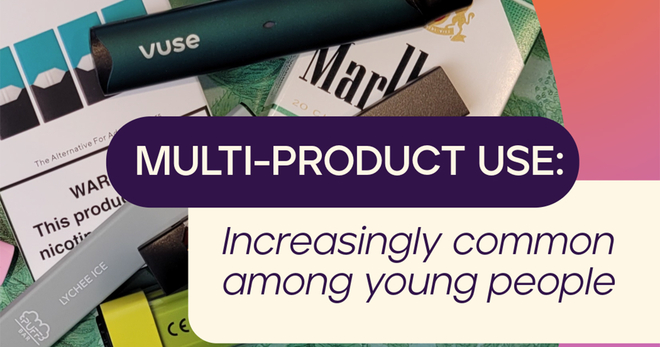Youth vaping, mental health and the importance of quitting: A Q&A with the National Council for Mental Wellbeing
Mental health and nicotine use are connected in ways many may not realize. Though nicotine has not been found to directly cause mental health conditions, peer-reviewed research shows that vaping nicotine can intensify symptoms of depression and anxiety and is linked to higher odds of having a depression diagnosis. For example, a study in the Journal of the American Medical Association (JAMA) found that current e-cigarette users have double the odds of having a diagnosis of depression than people who have never vaped.
As depression and anxiety among young people have increased due to the pandemic, and 1 in 5 high school students vape, with nearly 40% of those vaping frequently, addressing youth mental health and nicotine use together is especially important.
“Youth and young people are particularly vulnerable to early initiation and nicotine use due to exposure to trauma. We also see how vulnerable populations have been given misinformation, sold products based on this misinformation and ultimately are susceptible to early initiation and ongoing adult tobacco use,” said Tamanna Patel, who is director of the National Behavioral Health Network for Tobacco and Cancer Control at the National Council for Mental Wellbeing. “We understand this and we center our work on clarifying misinformation and helping clinicians, other trusted adults and organizations understand the benefits of quitting.”
Truth Initiative has partnered with the National Council for Mental Wellbeing for the truth campaign’s latest youth e-cigarette education effort, “It’s Messing with Our Heads,” which highlights the tobacco industry’s role in contributing to the current youth mental health crisis. The National Council for Mental Wellbeing seeks equitable access to mental health and substance abuse treatment for more than 10 million children, adults and families, and works to increase health providers’ abilities to diminish tobacco- and cancer-related disparities in individuals with mental health and substance use challenges.
The National Council established the National Behavioral Health Network for Tobacco and Cancer Control to help address health disparities identified by CDC’s Office of Smoking and Health and the Division of Cancer Prevention and Control. To discuss the youth vaping and youth mental health crises, Truth Initiative spoke with Tamanna Patel.
This interview has been lightly edited for clarity.
What is the current state of youth mental health in the U.S.?
What is the current state of youth mental health in the U.S.?
The pandemic has spared no one. In addition to the tragic loss of life and the devastating economic insecurity it has created, the pandemic has increased levels of depression and anxiety and fueled our nation’s overdose epidemic. A poll conducted by Morning Consult and released Sept. 8 by the National Council highlights the impact of the COVID-19 pandemic on young people and the increasing need for mental health and substance use information, resources and support for families and schools. Some of the key findings include:
- 73% of parents agree COVID-19 has affected the mental wellbeing of their K-12 children. A majority of parents say there has been a change in their children’s mental wellbeing during the past year and a half due to remote learning (62%) and social isolation stemming from COVID-19 restrictions (59%). The impact on children varies based on ethnicity, community type, region and the age of the child.
- A third of all parents (36%) say their child is experiencing anxiety around returning for the new school year. Parents with a child in kindergarten (41%) and middle school (43%) are more likely than other parents to say their child is experiencing re-entry anxiety.
Three quarters (73%) of parents say school districts should increase mental health support for children because of the effects of social isolation from COVID-19.
Our August 2021 survey revealed that many young people are turning to nicotine to try to relieve their stress, anxiety or depression. Has the National Council encountered similar findings?
Are young people are turning to nicotine to try to relieve their stress, anxiety or depression
We know youth and young individuals with mental health and substance use challenges are more susceptible to trying e-cigs or vaping devices owing to the belief, created through predatory marketing campaigns by the tobacco industry, that these products are safer than traditional combustible commercial cigarettes. If we focus specifically on youth, or adolescents, we know this period of brain development (age 13 to 25 – called the “transitional brain age”) is so important. Youth and young people have a higher risk of developing mental health and substance use challenges and experiencing trauma during this time. As such, we know they are more likely to try tobacco, vaping, use tobacco as adults – more of it, and for longer periods of time – putting them at risk for premature death.
We know nicotine exposure during this time can impact the brain. And vaping can lead to higher rates of nicotine product use. This is why it is essential we focus on the preventable causes during this formative period. In the past year, we, in collaboration with the Center for Disease Control, assessed the effects of the pandemic on substance use risks and drivers among 600 youth ages 12 to 18. What we learned through that assessment is that 44% of youth reported feeling stressed, 27% felt lonely, 25% felt worried or anxious and 24% felt depressed.
Individuals with mental health challenges, such as depression and anxiety, are twice as likely to have tried e-cigarettes and three times as likely to be users of e-cigarettes. In addition, individuals with mental health challenges often combine e-cigarettes with concurrent use of traditional combustible cigarettes, which may make them more at risk for nicotine addiction.
How has the National Behavioral Health Network for Tobacco and Cancer Control been able to push back against the tobacco industry’s marketing to youth?
How to push back against the tobacco industry’s marketing to youth?
Youth and young people are particularly vulnerable to early initiation and nicotine use due to exposure to trauma. We also see how vulnerable populations have been given misinformation, sold products based on this misinformation and ultimately are susceptible to early initiation and ongoing adult tobacco use.
We understand this and we center our work on clarifying misinformation and helping clinicians, other trusted adults and organizations understand the benefits of quitting. The fact is, the majority of individuals with mental health and substance use challenges want to quit, can quit, and are more likely to quit for good with the help of cessation medications and counseling. We also know this can enhance long-term recovery for persons with substance abuse challenges.
The Network pays attention to and seeks to develop programming that addresses vulnerable populations’ tobacco-related disparities including among youth and young individuals with mental health and substance use challenges. The focus of the Network is to engage with and train clinicians, other trusted adults and organizations on how to talk to adult, young adult and youth nicotine users and help them understand the effects of nicotine and withdrawal and how they can mimic anxiety. We do this by assisting these stakeholders in initiating or enhancing tobacco cessation activities such as tobacco cessation treatment and counseling services including Youth Screening Brief Intervention Referral and Treatment (YSBIRT) and other motivational interviewing practices.
Do you think more youth are turning to nicotine because they can’t afford mental health resources – perhaps especially in economic crises like the ones caused by the pandemic? What affordable or free resources does the National Council suggest to them?
Do you think more youth are turning to nicotine because they can’t afford mental health resources?
We, as a nation, continue to see significant challenges of mental health and substance use treatment and recovery access and affordability. It is at the core and the most important work we do at National Council – expanding access and affordability to ensure equitable access to high quality services.
We see similar challenges for youth as well. We know individuals struggle with mental health, struggle to access high quality treatment, and sometimes, in order to cope, young people and adults turn to high-risk behaviors owing to stresses, anxiety and challenges as a means to maintain mental health or gain some sense of relief. So, they may turn to substances, including nicotine, as a means to cope.
The National Council and the National Behavioral Health Network for Tobacco and Cancer Control has many resources available for providers and trusted youth-serving stakeholders. Through our Mental Health First Aid (MHFA) program, we have trained more than 2.5 million people in the U.S. to identify and respond to signs and symptoms of mental health and substance use challenges. The National Council has teamed up with the Born This Way Foundation to bring teen Mental Health First Aid, to teach high school students how to identify, understand and respond to signs of mental illnesses and substance use disorders among their friends and peers.
The National Behavioral Health Network for Tobacco and Cancer Control strengthens the capacity of public health, mental health, substance use and addiction recovery organizations through national webinars, trainings, one-on-one customized consultation and the development and dissemination of resources that can be found at bhthechange.org.
By texting DITCHVAPE to 88709, you consent to recurring messages from Truth Initiative to help you quit vaping, and agree to the Terms & Conditions and Privacy Policy. Text STOP to opt-out. Text HELP for info. Msg & Data Rates May Apply.
More in emerging tobacco products
Want support quitting? Join EX Program
By clicking JOIN, you agree to the Terms, Text Message Terms and Privacy Policy.
Msg&Data rates may apply; msgs are automated.


